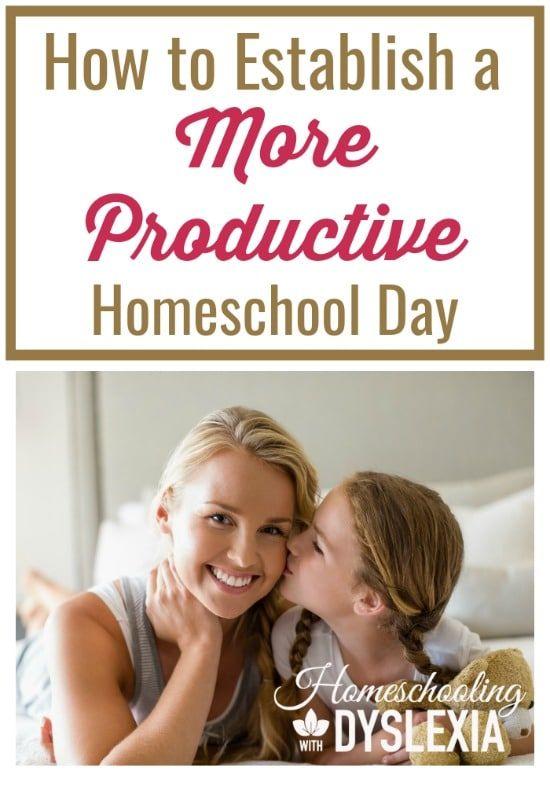There’s not a mom out there that doesn’t desire a more productive homeschool day. Juggling the many needs of running a home, caring for family needs, and nurturing a marriage can often leave us out of time or out of energy when it comes to teaching our kids at home.
Prefer to listen to this post? Click on the player below:
I often share a yearly homeschool day-in-the-life post where I give a peek into what my homeschool day with a bunch of kids with ADHD and dyslexia looks like. Hint: it’s probably a lot like yours – filled with interruptions, distractions, and wanting to get more done than there is time for.
One habit we have mastered however, is making sure we accomplish at least our minimum viable school day.
You may have heard of the business concept called the minimum viable product. Making the minimum viable product means to make the simplest, best product you can and start selling it even though it’s not the best that it could be. It is good enough and can be improved later.
In our homeschool, I use the concept of a minimum viable school day as a way to be intentional about the minimum amount of school work to get done each day. Not only does this make me more focused on essentials, it helps to keep anxiety and overwhelm from taking me hostage.
Completing a minimum viable school day ensures that my kids are doing something (even a small amount) in key subjects most days. It is the minimum amount of school we can accomplish and still feel good about our day. It’s not for every day but if it was, my kids would still be banking enough learning in the core subjects to add up to productive learning.
I was inspired to think about the concept of a minimum viable day by fellow homeschool blogger, Pam Barnhill, who writes about how to establish a Minimum Viable Morning. She details 5 simple steps for establishing key morning habits that set you up for a successful homeschool day. Here’s a link.
How establishing a minimum viable day increases productivity.
There is great value in thinking about what makes up the essentials of our homeschool day. Once we’ve taken the time to think this through, we’re better able to choose wisely when other non-essential things vie for our time.
Also, because our minimum viable homeschool day is manageable – meaning it doesn’t take a ton of time and energy, I feel confident that – with focus – I can get it done most days. Establishing a minimum viable homeschool day gives me confidence and momentum as I build a habit of doing our core school daily.

The Minimum Viable Homeschool Day: Dyslexia Edition
Our minimum viable homeschool day with elementary kids with dyslexia
Language Arts
One lesson from our Orton-Gillingham reading curriculum. To learn more about what we do in a lesson, read this post on what’s included in an OG lesson and download my free OG lesson planner.
Honestly, there are days when I don’t have time for an entire lesson. There are days when my kids can’t handle an entire lesson. My minimum viable reading lesson is to review sight words, build some words on the All About Reading letter tile app, and have them read a story from their reader or fluency sheets. My kids with dyslexia need a lot of review and even a small amount each day adds up to a lot!
Math
One lesson from math. We LOVE Teaching Textbooks for math because our kids can almost always do a lesson on their own. If unable to work on their own and I’m not available for some reason, I print off a math facts work sheet or two from the Math U See website. Again, a little bit everyday is better than nothing and even a small amount of review daily helps.
Audio Books
We almost always have an audio book that we’re listening to. Interestingly, we started listening to audio books when I had mischievous toddlers who would flush things down the toilets while I was captivated by reading books aloud to my older kids. Having someone else read meant I could listen and keep an eye on my younger kids. Plus the narrators are way more interesting than me. Audio books are amazing! Right up there with having a cleaning lady if you ask me. 😉 Audio books (and reading aloud if able) provide a substantial amount of learning. From geography and history to character and life lessons, good literature is an essential part of our school days.
For more information on the best resources for audio books, read this post.
Outside Time
Copious amounts of research declare the importance of time spent outside playing. From the vitamin D, to the exercise, to the imaginative play that it inspires, outside play is an EASY essential to add to my minimum viable day.
How to Plan for Your Minimum Viable Homeschool Day
Ask yourself, what are the 1, 2, or 3 things absolutely essential to a ‘successful’ homeschool day. For kids with dyslexia (often accompanied by memory issues) I recommend focusing your limited time and energy on reading, writing, or spelling. Determine which area your child needs at this point in time.
Suggestions for reading:
- review sight words
- read through fluency sheets
- reading aloud to an older sibling
- copywork – copy an interesting sentence (or 2 or 3 depending on age and ability) or a list of spelling words
- pick something for review, for example, if your child read a story from their reader the last time you did school, have them read it on their own
- reading apps like Nessy, Logic of English, or All About Reading
- speaking a ‘sloppy copy’ of a paper into Dragon Dictate or another speech-to-text app
Suggestions for math:
- complete a math lesson independently, if possible
- print off a math fact worksheet or use another hands on math program
- play a strategy game with siblings
- help a younger sibling with their math
- listen to skip counting songs on CD or online
For older kids in middle school or high school with dyslexia, try adding some independent work, such as:
- Completing a writing or math lesson online
- Listening to a literature assignment
- Researching a topic of interest and giving a short oral presentation at dinner
Read this post on how I homeschool high school with dyslexia and ADHD.

The Big Picture
I get heartfelt emails every day from moms who are struggling to ‘get it all done’. I wrote an entire post on strategies for getting more done as a homeschoolers. Although my kids are older now, not long behind me are the days of toilet flushing toddlers and babies who would. not. sleep.
During those years, I learned to love the teachings of British educator, Charlotte Mason. She was a proponent of short, intense lessons, quality literature, and lots of time spent outside. She also gave an amazing list of three things to provide for your kids daily:
- something to do,
- something to love, and
- something to think about
These three things are fundamental to a rich childhood and can be achieved, despite interruptions to our regular homeschool schedule, with a minimum viable homeschool day.
Learn more about the natural and dyslexia-friendly Charlotte Mason teaching method here.
How about you? Do you have a minimum viable school day? What does it look like? Share in the comments below!
Related Posts
Am I Getting Enough Done in my Homeschool?
Help! My Homeschooler is Behind!
Hands-on Learning Ideas for Kids with Dyslexia







What a beautiful post. Thank-you! Our minimum viable day is reading (we also use AOR), violin practice, and time outside. Reading and violin can be as short as 1/2 hour/child but they can also be up to 1 hour/oldest child. The rest is all a bonus (especially on the days when my twin toddlers are flushing things down the toilets)!
And when I do have that “extra”, I want it to be something to think about or do that makes the world a better place. A good discussion. An act of kindness. A thank-you note. Building empathy. An act of social justice.
Thanks-you for the reminder!
Can you tell me more about Teaching Textbooks? I have looked into this curriculum a little. My son is being evaluated for dyslexia on the 28th of this month so we aren’t sure yet if he is dyslexic but we suspect he is at least mildly dyslexic.
We are currently using Saxon Math but it seems to be getting more challenging for him and causes a lot of frustration between him and me during the school day. Wondering if switching to Teaching Textbooks might help with this. Thanks for the help.
Here is the link to a review I wrote recently that details why we like TT so much:https://dev.homeschoolingwithdyslexia.com/homeschool-math-teaching-textbooks-review/
Love the suggestions! I tend to homeschool that way. We use Logic of English and some days the lessons are just too long to keep their attention, so I will split the lessons. My question is, however, what happens when you get so far behind that it would be killer to catch up? This happened with my second son. I used Life of Fred for math with my first son, but my second son just didn’t get it. We switched to Math Mammoth which he has made great strides with, but because we had to switch curriculum and slow down we are now behind. He is in the 7th grade and doing level 5 of Math Mammoth. How do you feel about grade level/leveled materials and what the goal should be?
With Math I have a few thoughts. One is work through the summer (at least 3 days per week) and don’t stress. Math is foundational so skipping ahead won’t work. Two, pushing some – if they are able – is important if they are going to college. Doing Algebra in college is a painful waste of time. Much better to get those requirements out of the way before college! Another idea is to hire a really good math tutor to get him up to speed. See if you can find someone who will work without your curriculum and just focus on the concepts he needs to learn.
Thank you, thank you, thank you! This game at just the right time! I am deeply grateful for you wisdom and encouragement!
Thank you Christy!